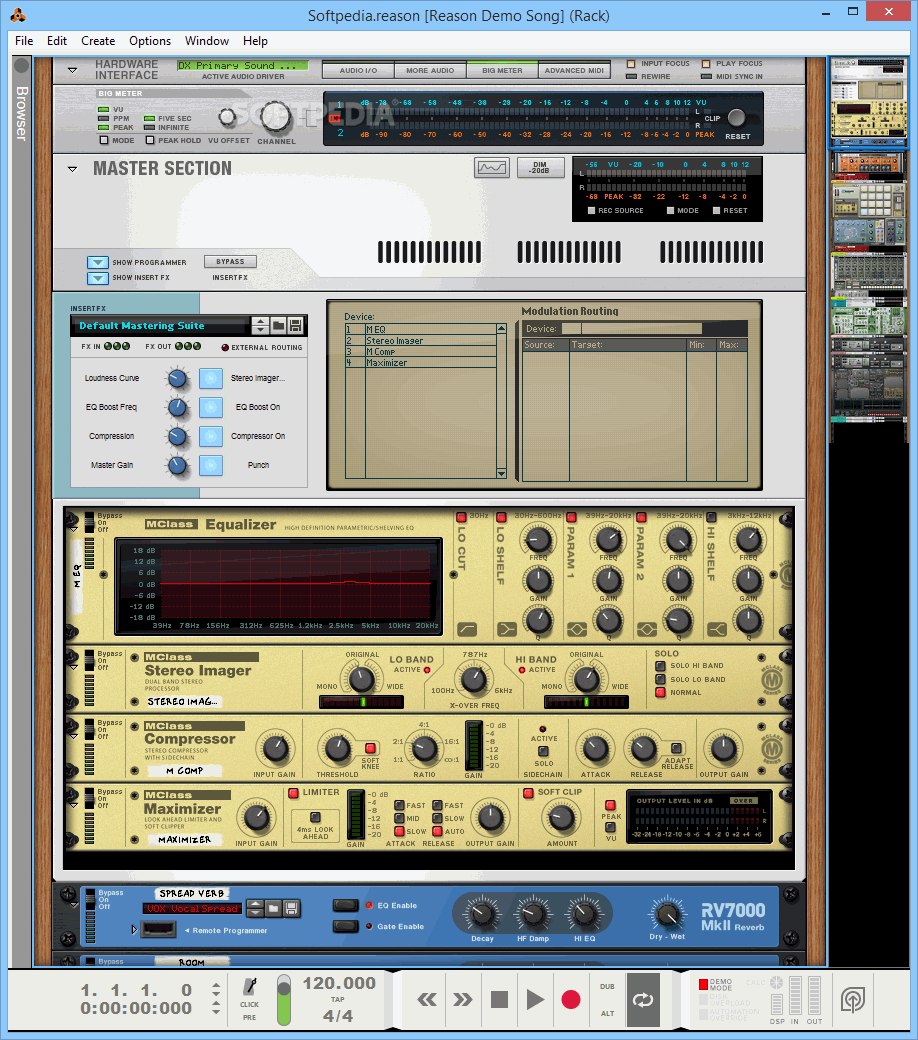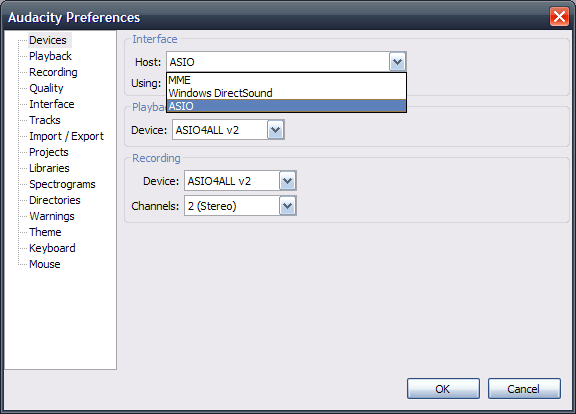- 4: With Sony Acid, choose Eleven Rack ASIO as the audio device type. In this screen shot, the Guitar In/Mic In driver is being chosen as the default audio recording device, but you can change this within any Acid audio track using the Record Input selector. 5: Use Cubase’s Device Setup to specify Eleven Rack as the VST Audio System.
- Audio Stream Input/Output (ASIO) is a computer sound card driver protocol for digital audio specified by Steinberg, providing a low- latency and high fidelity interface between a software application and a computer's sound card.
Since Audacity doesn’t support ASIO drivers without advanced modification of the program, using Apogee ONE, Duet and Quartet with Audacity requires these specific steps: SAMPLE RATES MUST BE MATCHED MANUALLY in: Control Panel Sound Playback (Select Apogee Interface) Properties Advanced Control Panel Sound Recording (Select Apogee Interface). Audacity is open-source software, which allows you to record and edit audios and tracks for free. It is a very useful tool for musicians. They can easily record, mix, edit, and split their audio using this software. ASIO is an interface for audio software exclusive to Windows.
The proprietary ASIO interface standard is essential on Windows for low latency recording and playback. It is also usually the best way of making Multi-channel recordings on Windows.
- Licensing restrictions prevent us including ASIO support in released versions of Audacity, but Audacity can be compiled with ASIO support for private, non-distributable use.
- This page summarizes ASIO licensing issues and steps to compile Audacity with ASIO support.
Latencies on Windows, Linux and Mac
ASIO is a proprietary audio interface standard in use on Windows which bypasses the operating system's mixing kernel, so providing lowest latency direct communication between computer audio software and hardware.
- ASIO supports 24-bit sampling which is only otherwise available under Windows WASAPI or WDM-KS (Windows Driver Model Kernel Streaming). 24-bit sampling allows greater dynamic range, lower theoretical noise floor and greater resolution at lower audible volumes.
- An unmixed ASIO output is 'bit identical' to the original source.
- Multiple physical input and output channels of the hardware are accessed over one single device.
On Linux, the standard ALSA audio API typically provides lower latencies than Windows under MME or Windows DirectSound. However, many Linux distributions now use PulseAudio by default for audio routing and mixing. PulseAudio sits between the sound source and the Linux kernel and thus has somewhat higher latency than direct use of ALSA. For lowest latencies, you can use the JACK API that provides both low latency audio communication and audio routing between applications. Current Audacity supports JACK fairly well, but with some limitations.
On Mac, Core Audio is the standard API and is fully supported by Audacity. Core Audio also has lower latencies than Windows under MME and Windows DirectSound but Jack OS X can be used for lowest latency.
Audacity and ASIO
The ASIO technology was developed by German company Steinberg and is protected by a licensing agreement which prevents redistribution of its source code.
Audacity, as an open source program licensed under the GPL, is therefore currently unable to support ASIO, despite being ASIO-capable (providing the user's sound device is similarly capable). If ASIO support were distributed in Audacity builds this would either violate Steinberg's licence agreement if the code were included, or conversely would violate Audacity's GPL Licence if the code were withheld. There are persistent rumours of Steinberg opening up licensing, but without any apparent movement. Anyone who cares about this issue is invited to make their views known to Steinberg via their Contact page.
Audacity Asio
Non-distributable ASIO support in Audacity
Audacity provides ASIO support on Windows for individuals who are prepared to compile Audacity from source code using the optional Steinberg ASIO SDK.
ASIO support is provided strictly on the basis that it is NON-DISTRIBUTABLE, that is, you may NOT copy or distribute builds including ASIO support to anyone else. The build is strictly for your own personal (private or commercial) use. For the same reasons, Audacity can NOT distribute builds of Audacity including ASIO support, so please don't ask!
The following is an overview of compiling Audacity from source code including ASIO support.
- Install the free Microsoft Visual Studio Community Edition Integrated Development Environment (IDE).
- Download and install the ASIO SDK from Steinberg.
- Download the source code of the latest Audacity release from https://github.com/audacity/audacity/releases. Follow the steps in win/compile.txt in the source code to:
- Download and install the wxWidgets GUI toolkit then build wxWidgets using Visual Studio.
- Set the WXWIN environment variable to the directory where you installed Widgets and set the ASIOSDK_DIR environment variable to the directory where you installed the ASIO SDK. Reboot the computer.
- Build Audacity using Visual Studio.

Follow the instructions and download links on Developing On Windows in the Audacity Wiki for full details.
| Operating system | Microsoft Windows |
|---|---|
| Type | API |
Audio Stream Input/Output (ASIO) is a computer sound card driver protocol for digital audio specified by Steinberg, providing a low-latency and high fidelity interface between a software application and a computer's sound card. Whereas Microsoft's DirectSound is commonly used as an intermediary signal path for non-professional users, ASIO allows musicians and sound engineers to access external hardware directly.
Overview[edit]
ASIO bypasses the normal audio path from a user application through layers of intermediary Windows operating system software so that an application connects directly to the sound card hardware. Each layer that is bypassed means a reduction in latency (the delay between an application sending audio information and it being reproduced by the sound card, or input signals from the sound card being available to the application). In this way, ASIO offers a relatively simple way of accessing multiple audio inputs and outputs independently.
Operating systems[edit]
Interface support is normally restricted to Microsoft Windows. Starting with Windows Vista, KMixer has been removed and replaced by WASAPI and a new WaveRT port driver.
There is also an experimental ASIO driver for Wine, WineASIO,[1] for a Windows compatibility layer for Linux. WineASIO driver uses the JACK sound server as its audio back-end and allows many ASIO-aware applications to run with low latency under WINE.
Other free or open source alternatives are ASIO4All,[2] FlexASIO,[3] ASIO2KS,[4] and ASIO2WASAPI.[5]
Being a proprietary protocol, it does not have any universal compatibility with Windows-based DAW and other recording software. For example, the user manual of the Audacity audio editor states: 'Licensing restrictions prevent us including ASIO support in released versions of Audacity, but Audacity can be compiled with ASIO support for private, non-distributable use.'[6]
See also[edit]
- JUCE, an open-source C++ toolkit that includes support for ASIO audio devices.
References[edit]
Download | Audacity
- ^WineASIO website
- ^ASIO4All website
- ^FlexASIO website
- ^ASIO2KS website
- ^ASIO2WASAPI website
- ^'ASIO Audio Interface'. 2008. Retrieved 2 December 2019.
External links[edit]
Asio Sdk
